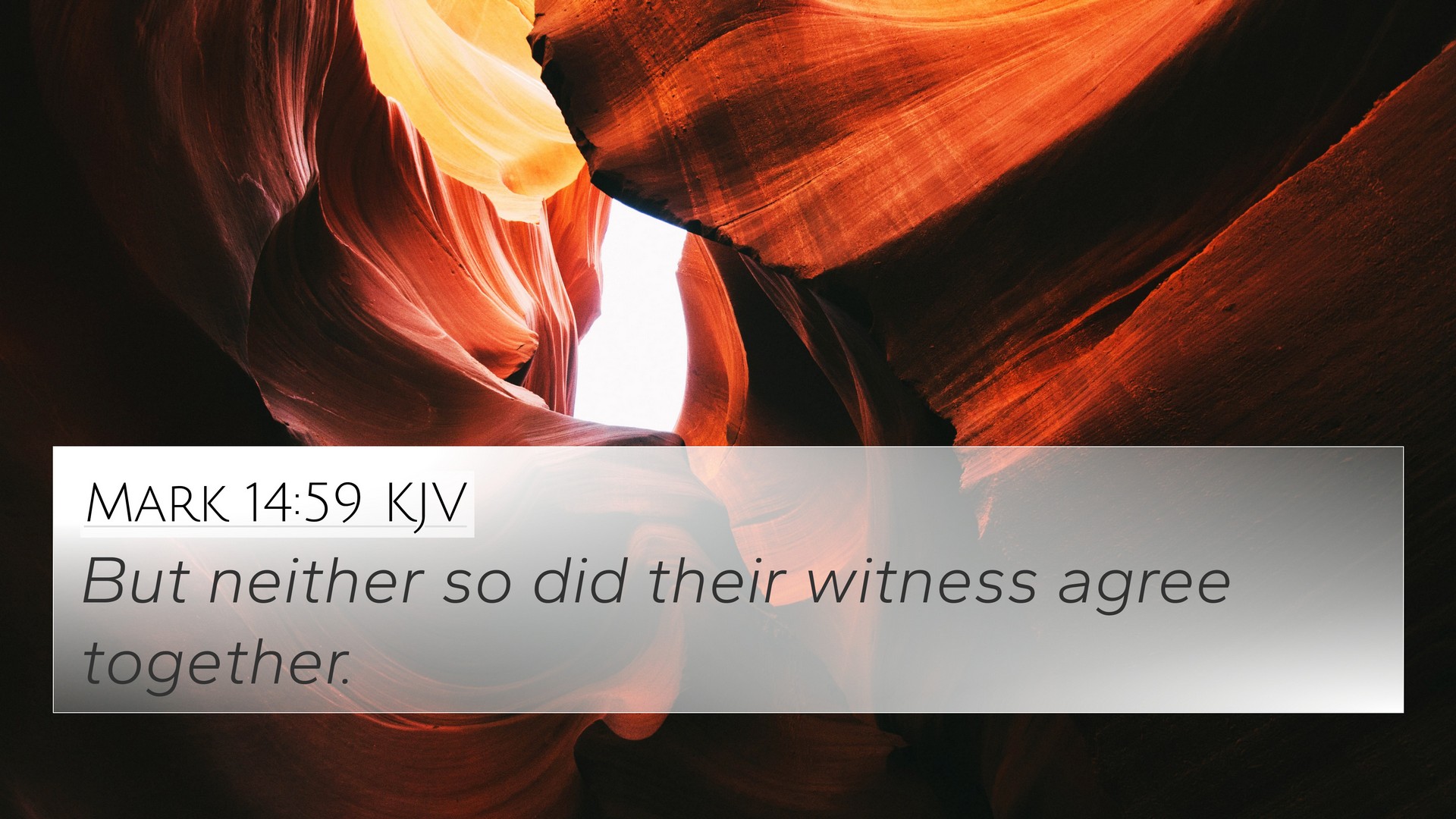Understanding Mark 14:59
Mark 14:59 states:
"And not even so did their witness agree together."
This verse occurs during the trial of Jesus, where false witnesses are brought forth to testify against Him. The context reveals a significant moment in the narrative, highlighting the deceit and conspiracy among those seeking to condemn Jesus. Below, we explore various interpretations and meanings derived from public domain commentaries, and provide scriptural connections that enhance our understanding.
Verse Meaning and Context
The testimonies presented against Jesus were not only false but also disjointed. This inconsistency signifies the lack of truth in their accusations. The emphasis on their disagreement serves multiple purposes in the text:
- Injustice in the Testimony: The failure of the witnesses to have a coherent agreement reveals the corruption and desperation of those accusing Jesus. Matthew Henry notes that this reflects the lengths to which the religious leaders would go to secure Jesus' condemnation.
- Prophetic Fulfillment: Albert Barnes highlights that the events surrounding Jesus' trial correspond to the prophetic scriptures highlighting the rejection of the Messiah. The disjointed testimonies fulfill the theme of opposition to God’s anointed.
- Exposing Evil Motives: Adam Clarke suggests that the lack of unity in testimony implicitly exposes the unrighteous motives of the accusers, drawing attention to their intent to conspire against a figure perceived as a threat to their authority.
Thematic Connections
This verse connects thematically to various other scripture that depict the nature of false witnesses and the consequences of deceit:
- Psalm 27:12: "Deliver me not over unto the will of mine enemies: for false witnesses are risen up against me, and such as breathe out cruelty."
- Proverbs 14:5: "A faithful witness will not lie: but a false witness will utter lies."
- Isaiah 53:7: "He was oppressed, and he was afflicted, yet he opened not his mouth: he is brought as a lamb to the slaughter, and as a sheep before her shearers is dumb, so he openeth not his mouth."
- Matthew 26:60: "But found none: yea, though many false witnesses came, yet found they none. At the last came two false witnesses."
- Exodus 20:16: "Thou shalt not bear false witness against thy neighbor."
- Acts 6:13: "And set up false witnesses, which said, This man ceaseth not to speak blasphemous words against this holy place, and the law."
- 1 Peter 3:16: "Having a good conscience; that, whereas they speak evil of you, as of evildoers, they may be ashamed that falsely accuse your good conversation in Christ."
- John 8:44: "Ye are of your father the devil, and the lusts of your father ye will do. He was a murderer from the beginning, and abode not in the truth, because there is no truth in him."
- Revelation 21:8: "But the fearful, and unbelieving, and the abominable, and murderers, and whoremongers, and sorcerers, and idolaters, and all liars, shall have their part in the lake which burneth with fire and brimstone: which is the second death."
- Galatians 6:7: "Be not deceived; God is not mocked: for whatsoever a man soweth, that shall he also reap."
Cross-Referencing Biblical Texts
To gain a deeper understanding of Mark 14:59, it is effective to employ Bible cross-referencing techniques. By identifying connections between different scriptures, readers can enrich their biblical studies. Here are some tools and methods to consider:
- Bible Concordance: Use a Bible concordance to find keywords related to false witnesses, injustice, and trials. This will help in exploring broader themes.
- Bible Cross-Reference Guide: Utilize guides that offer links between Old and New Testament teachings, providing a comprehensive view of related themes.
- Cross-Referencing Bible Study: Engage in group studies that focus on inter-Biblical dialogue, sharing insights on how different passages relate to one another.
- Bible Reference Resources: Access reference materials that compile chain references, allowing for an organized approach to understanding biblical themes.
Application and Reflection
This verse invites reflection on the nature of truth and integrity. In contemporary contexts, it prompts believers to consider the following:
- How do we ensure our testimonies are truthful and align with Christ's teachings?
- What actions do we take when we see injustice or falsehood in our communities?
- In what ways are we encouraged by the example of Jesus, who faced false accusations with grace?
Mark 14:59 serves as a profound reminder of the weight of truth and the dangers of malicious intent. As believers engage in cross-referencing Biblical texts, they will find not only connections between individual verses but also a deeper understanding of the overarching narrative of redemption throughout Scripture.


